 |
 |
 |
 |
 |
 |
 |
 |
 |
FA Cup final replay - Old Trafford - 62,078
Scorers: Jones
Leeds United: Harvey, Madeley, Cooper, Bremner, Charlton, Hunter, Lorimer, Clarke, Jones, Giles, Gray
Chelsea: Bonetti, Harris, McCreadie, Hollins, Dempsey, Webb, Baldwin, Cooke, Osgood (Hinton), Hutchinson, Houseman
They had given a wonderful exhibition, all the more remarkable taking
into account the appalling state of the pitch. Geoffrey Green of The
Times reported, perhaps overstating the case a little, 'What must
be beyond dispute is that here, technically - remembering the killing
conditions - was the finest Cup final seen at Wembley since the war, better
even than Manchester United and Blackpool of 1948 and lacking only the
emotional impact of the last 20 minutes of the Stanley Matthews fiesta
of 1953.' But, if the game demonstrated a lot that was great about English club
football, the replay that followed two and a half weeks later at Old Trafford
won a reputation for being the dirtiest final ever. Three decades later former referee David Elleray reviewed a DVD of the
match against the standards set by modern day refereeing. He came to the
conclusion that Leeds should have had seven bookings and three dismissals
(Giles, Bremner and Charlton), while Chelsea deserved 13 bookings, including
three each for Webb, Harris and Cooke. The referee in charge of the actual game, Stourbridge's Eric Jennings,
took a laissez faire approach to the contest, offering plenty of leeway
and booking just one player, Ian Hutchinson of Chelsea. Blues midfielder
John Hollins would later say, 'People were standing up to each other,
head-to-head, as they do nowadays except they were hitting each other.
The ref would say, 'Play on, keep going'. He played great advantage. If
he had stopped it, there would have been an incident. The incident didn't
happen because he simply played on.' 47-year-old Jennings was in his last season as a Football League referee
having reached the maximum age in January and had enjoyed sixteen years
as a first class official, running the line in the 1958 Cup final and
officiating in the 1967 Amateur Cup final. He had some history with Leeds:
in November 1963 he had been forced to stop play and call together both
sets of players to appeal for calm when United were involved in something
of a bloodbath against Preston; in May 1966 he had to do the same during
an ill-tempered clash against Burnley at Turf Moor. Johnny Giles: 'There was so much stick flying around, I have to admit
it was pretty horrendous, and I make no excuse for it. But we did have
some strange code of honesty ... I'm sure of two things. One is it that
it was inevitable the game would come to its senses, and that no one who
played or managed the game back then would have had any part of today's
culture of diving. Then you took stick and you handed it out, but you
couldn't imagine faking injury or trying to get a player sent off. Maybe
he would be carried Chelsea's Alan Hudson, who missed both the final and the replay through
injury: 'Tommy Baldwin and Terry Cooper, two of the quietest men in football,
kicking lumps out of one another as the battle began. Tommy, a prolific
goalscorer when given the opportunity, was handed strict orders not to
allow the weaving Leeds full-back to get too far over the halfway line,
if over at all. Ron 'Chopper' Harris did not need any telling. His scything
tackle on the wing wizard Eddie Gray in the opening minutes was chilling.
That set the pattern of the match. It was the only way we could have won
it, by fighting white fire with blue fire, and the outcome was for all
to see. Someone joked that Gray was picking Chopper's studs out of his
shins well after that final whistle. He collected more shrapnel in that
game than a veteran of the Somme in World War One!' The Independent: 'The match provided a lengthy sheet of misdemeanours.
Chelsea's hard men systematically targeted Gray, and Harris finally nailed
him late in the first half with a malicious kick on the back of the left
knee. Moments later, Charlton headbutted
and kneed Osgood after the Chelsea striker had tackled him from behind.
Wherever you looked on the field there was mayhem, as players kicked,
gouged and butted each other with impunity. The next morning, one paper
summed up with the banner headline "Robbery With Violence"'. The game was awaited with great anticipation following the excitement
of the first contest, but Chelsea set their stall out to prevent Leeds
from enjoying the dominance they had at Wembley. Eddie Gray had given
David Webb a roasting and now manager Dave Sexton switched Webb and Harris,
lining the famous Chelsea hard man up against Gray with the intention
of kicking him out of the game. Webb's reckless challenges were more easily
compensated for in the centre of defence, where his colleagues could offer
him greater protection. It was clear from the first seconds that Harris would be closely shadowing
Gray, denying him the time and space that he enjoyed at Wembley. Conversely,
Lorimer and Jones were far more dangerous than in the first game, pulling
defenders all over the place and constantly threatening. Sexton also switched the roles of Peter Houseman and Charlie Cooke. As
Geoffrey Green wrote, 'It will be Cooke's job now to ferret and supply
his forwards from the rear, joining into attack himself, of course, as
the situation warrants, and leaving Houseman to float down the left flank
in his accustomed fashion. It was Cooke's astute reading of the situation
last time, when he sustained Chelsea's flagging spirits by doubling back,
supplementing midfield and dribbling cleverly to win time and space that
helped to save the day for the south. It was this, no doubt, that influenced
Dave Sexton, the Chelsea manager, to rethink his line-up.' For Leeds the only change was reserve goalkeeper David Harvey coming
in for Gary Sprake, who had been injured in the European
Cup semi-final against Celtic. Harvey commented, 'I'm very sorry for
Gary, and I hope I don't let him or the side down.' Heavy rain fell for hours on the Old Trafford pitch on the day of the
game, and Don Revie smiled, 'I am
happy to see the rain. The ground will suit us much better if it is soft.'
He went on, 'Naturally we are very confident but we must put the Wembley
match right out of our minds. We cannot use that as a yardstick for what
will happen at Old Trafford. We must treat both matches as entirely separate
events.' With a television audience estimated at 32m watching the game live, Leeds
kicked off and were instantly onto the attack - within the first minute
Lorimer's cross hit Dempsey and the deflection almost took it into the
Chelsea net. Then Gray had a sprint down the left touchline and used his
pace to go round Harris; he managed to get in a smart low cross before
the tackle came in. Mick Jones flicked the ball on with Webb unable to
get to him and Bonetti got down well to touch the effort wide. After 12 minutes Chelsea had another escape. Cooper's long centre swung
away from Bonetti and Lorimer turned it back across goal. Gray could have
shot but returned it to Lorimer. He went for the spectacular and only
succeeded in sending the ball miles wide of goal. United continued to press and for the ten minutes up to the half hour
they ratcheted up the pace, forcing Chelsea back onto desperate defence.
There was an exchange of punches between Hunter and McCreadie as tempers
frayed and with the crowd's attention diverted, Gray took the opportunity
to run into space, his shot running narrowly wide. In the 25th minute, Dempsey attempted a back pass to Bonetti with the
keeper miles away from his station. Lorimer beat him to the ball, only
to see his shot from an acute angle saved on the line by McCreadie. It required a tremendous Dempsey tackle to prevent Clarke capitalising
on a long ball from Lorimer. In turn the Scot hammered a right-footed
drive narrowly wide. Jones got into the action by putting an effort into
the side net from close range after Giles had combined with Gray down
the left to create the opportunity. On the half hour Bonetti was injured in an aerial clash with Jones as
the two went for a steepling Madeley centre from the right. There was
a mass protest from Chelsea at what they saw as flagrant foul play. Action
was held up for three minutes for the keeper to get treatment and he was
badly limping when he restarted. The handicap didn't stop him from continuing
to substantiate his long-held status as arch nemesis of Leeds United forwards. Chelsea responded furiously to what they saw as intimidation by launching
an all out assault on the United goal. It cost them heavily, for in the
36th minute Leeds took a deserved lead after coolly playing themselves
out of trouble. Harvey's throw out of his goal area was picked up by a Chelsea man who
tried to He slipped the ball short to Jones 40 yards out and let his partner carry
the move on. The centre-forward set off on a storming run, coming away
from Hollins and Harris and resisting intense pressure from McCreadie
to make his way into the right hand side of Chelsea's area. From there
he hammered a thunderous right-footed shot across Bonetti and into the
net. Geoffrey Green in The Times: 'It was a goal from the past, as
old-fashioned as the horse and carriage. It revived memories of Ted Drake
in his heyday.' Leeds took that well-deserved lead into the break. Almost immediately after the resumption Cooke and Clarke started kicking
seven bells out of each other. Referee Jennings turned a blind eye, as
he had throughout the first half, but finally, there came an incident
which even he could not ignore. Charlton and Osgood were involved in a
scramble near the touchline and the striker took Charlton out. The big
man completely lost it, got to his feet, stormed after Osgood and scythed
him mercilessly to the ground. Even then Jennings merely gave them a severe
talking to and no names were taken. It was the 65th minute before the
referee's tolerance was finally tested too far. Osgood and Bremner tangled
and when the Scot appeared to be hacking at the fallen Chelsea man, the
referee thought it worth only another cool glance. So Hutchinson rushed
up impetuously to push Bremner to the ground and was cautioned. It was
the only booking of the night. Around the same time Harvey confirmed his worth as Sprake's deputy. He
had given a brave and effective performance whenever called upon and his
save from a close range Baldwin header after Madeley had failed to prevent
the opportunity was outstanding. But Leeds still drove forward, pressing to increase their lead. Hunter
won a ball from a Chelsea defender 25 yards from the Blues' goal line
and slipped it to Gray out wide on the left. He flicked it back to Cooper
who played the ball forward and twisted and turned round two defenders
to catch it and loft over a cross from the byline. Jones challenged a
defender in the air and the ball ran out to the edge of the area for the
onrushing Giles to strike low for the bottom corner. It was deflected
by a Chelsea man and scraped the post and the side netting with Bonetti
stranded. Cooper, as if intent on exorcising the ghost of Celtic's Jimmy Johnstone
and the personal nightmare that was the European Cup semi-final, was in
superb attacking form throughout the game. Moments later, he set off on
another storming run through the heart of the Chelsea defence to hammer
a shot right-footed from the edge of the area which Bonetti could only
push away. Geoffrey Green: 'By now Osgood, Cooke and Hollins had begun to play beautifully,
moving the ball smoothly in flowing moves of unexpected angle. Suddenly,
they began to burn some magic fuels. Here was the echo of Wembley again.
Having been largely overplayed there for a long period, as now, they began
to come at the right moment. The change in the tide, and the feeling it
communicated to the packed company, gave 'Where once the great steam roller of Leeds had driven forward, with
Giles and Bremner putting Jones, Gray and Lorimer into full stride, and
with Clarke adding some highly cultured and sensitive touches, it had
all been one way. Now it was the elegant Osgood, the elusive Cooke and
the non-stop Hollins who oiled Chelsea's wheels at last. 'With 10 minutes left they suddenly were level. Theirs, too, was a beautiful
goal: more complicated, more finely ingrained, more liquid and created
virtually out of nothing. Here was the poetry of football and it came
with a magical exchange of passes between Hollins, Hutchinson, Osgood
and then the hard-running Cooke. Over came Cooke's perfect chip and there
was Osgood infiltrating from the left to the blind side to head a magnificent
goal.' There was a clear lack of concentration in United's defence; Osgood found
a huge gap with five United defenders stood round him looking on and querying
pathetically who was picking the striker up. For a team with the mean
defensive reputation of United, it was an astonishing lapse. Jack Charlton: 'I blame myself for that goal. I'd been waiting on their
goal line for a corner kick when one of the Chelsea players - someone
who'd better remain nameless - whacked me in the thigh with his knee.
After the corner was cleared I started to chase him, way over to the right.
Then the ball was knocked in long to our box and I started to run back,
but I was still hobbling after the whack in the thigh and I couldn't get
there in time to stop Peter Osgood heading his goal.' Charlton's defensive partner, Norman Hunter, writing in his autobiography,
also accepted the blame for allowing Osgood a free run, despite a shouted
warning from Paul Reaney from the sidelines. In the normal time that remained there was some fierce and frenetic action.
Bremner was heavily involved: United had justifiable claims for a penalty
ignored when McCreadie appeared to be intent on decapitating his Scottish
international colleague. For the umpteenth time Cooper went racing down the left wing and lofted
in a high centre. It bounced out from an aerial challenge and McCreadie
leapt up feet first into a wild and dangerous high kick that took Bremner
in the forehead. The Scot was left writhing on the ground holding his
head for what Referee Jennings saw Cooper pick up the ball and shape for a shot. He
played advantage but none was taken as Chelsea blocked the chance. Osgood
and Hutchinson went away to fashion an opportunity which ran narrowly
wide of Harvey's post. Bremner required lengthy treatment from trainer
Les Cocker before he was anywhere near fit to carry on. Following that he tangled heavily with Hutchinson and received a rebuke
from Jennings; and finally he was sent crashing to the ground as he raced
in on goal, reacting angrily when more penalty claims were refused. Jones nearly snatched an injury time winner with a flying header at a
Lorimer cross but the ball went narrowly wide. 210 minutes of football had failed to produce a decision and the two
teams thus had to line up for another 30 minutes of hard labour. Don Revie sought valiantly to rally his men to one last effort in an
extraordinary season, imploring them for one final push. He got a response,
despite the tired limbs and minds, but it was the Londoners who rose to
the occasion at the last to get their noses in front. One minute before the end of the first period of extra time, Chelsea
broke the deadlock, taking the lead for the first time in this marathon
contest. The goal was created by one of Hutchinson's trademark whirlwind long
throws from Chelsea's left touchline 30 yards out. Charlton met the ball
at the front post but could only succeed in allowing the ball to flick
off his head in a lofty and inviting arc across the face of his own goal.
Harvey had tried to come through and punch clear but couldn't find an
avenue past Charlton. In the melee that followed Webb rose above Gray
and Cooper at the back post to bundle the ball home with his head. That reverse should have been enough to kill off any fight that remained
in the exhausted Leeds men, but they forced themselves into a final throw
of the dice, throwing everything into desperate,
headlong attack. It was a wild eyed attempt to claw something from an
amazing season that, when once so much glory had beckoned, now
promised to leave them empty handed. Osgood was replaced with That was a rare excursion upfield for Chelsea as virtually the entire
fifteen minutes were played out in and around the Londoners' area. Leeds could not turn their late domination into a goal and were left
distraught at the end of four hours of combat. Charlton stormed off the
field ahead of anybody else - not bothering to collect his runners up
medal - furious that Leeds had lost. He said later, 'The disappointment
was incredible. I went straight to the dressing room and kicked open the
door. I've never been more upset over losing a game, maybe because it
was partly my fault. Nobody else came into the dressing room, and I just
sat there and sat there for ages, before all of a sudden the lads started
to drift in with their losers' medals. It was only then I realised I hadn't
collected my own medal. To this day I'm not sure if I ever got it - though
I suppose I must have done.' It was the most galling and inequitable of setbacks for a club that had
become hardened by a succession of near misses over the previous six years. The Yorkshire Post: 'Victors take the plaudits, losers only consolation
in Cup football, but Leeds can draw justified solace from an unqualified
success last night - in their ability to entertain. Leeds' manager, Don
Revie, promised a more adventurous, more attractive Leeds United at the
start of the season and their last match bore indelible testament to the
fruition of his aim. Leeds went forward as though they had never learned
how to defend - by necessity in the final analysis but from choice for
most of the match - and wove into their determination strains of admirable
skill and invention from Gray, Clarke, Bremner and Cooper. 'They had entertained magnificently; they had achieved more in failure
than most clubs in success, but the league championship had eluded them,
the European Cup had eluded them, and now the FA Cup had slipped away.
There is nothing so cruel as melted visions of what might have been ...' Don Revie, clearly dejected after the game, admitted, 'This is the biggest
disappointment of all. Coming after two defeats and after we had put the
pieces together it is bitterly disappointing - more so for the players
than for myself. I thought we played as well in the first half as we did
at Wembley, despite Chelsea's tactical moves, and they didn't score until
their first real attack. 'We were pushing the ball around well and might 'David Harvey did an excellent job for us. We have the type of players
with the character to come back next season, and if anyone says to me
at the start of next season that we can finish second in the League and
runners up in the Cup final I will be well satisfied. 'I am sick and disappointed more for the players than for myself. Now
we'll have to start all over again. I think it was bound to catch up on
us. There have been no easy matches.' Geoffrey Green in The Times: 'Leeds, like Sisyphus, have pushed
three boulders almost to the top of three mountains and are now left to
see them all back in the dark of the valley. 'Should it be any consolation to them, Leeds have now probably won something
more in defeat as good losers than they would have done in many hours
of victorious celebrating - universal public sympathy. They have done
their image good.'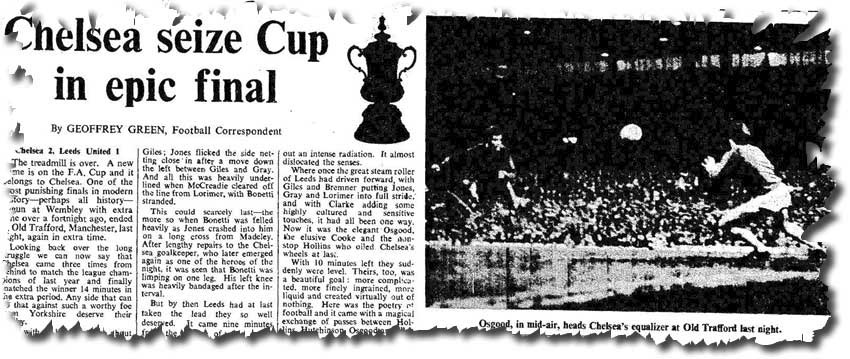 Leeds
United failed to defeat Chelsea in the 1970 FA
Cup final at Wembley on 11 April, but in every respect other than
the scoreline, they were streets ahead of their fierce London rivals,
striking the woodwork on three occasions and dominating the game. They
also had the consolation of finally doing themselves justice in a Wembley
final, expunging the dire memories of 1965
and 1968, when they had played in two of the
worst games in the stadium's history.
Leeds
United failed to defeat Chelsea in the 1970 FA
Cup final at Wembley on 11 April, but in every respect other than
the scoreline, they were streets ahead of their fierce London rivals,
striking the woodwork on three occasions and dominating the game. They
also had the consolation of finally doing themselves justice in a Wembley
final, expunging the dire memories of 1965
and 1968, when they had played in two of the
worst games in the stadium's history.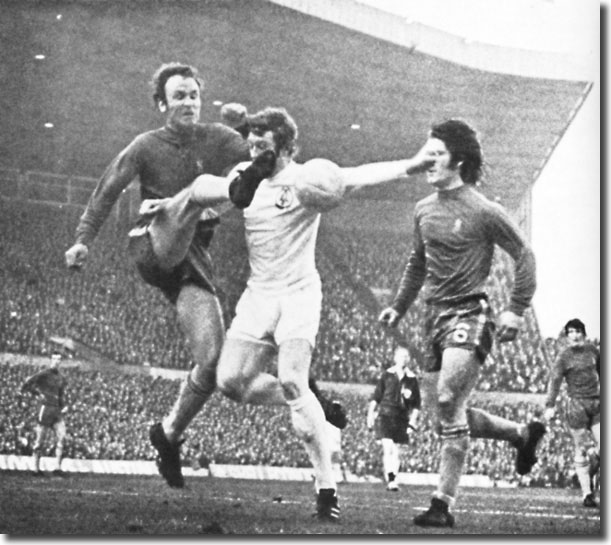 off,
but that would be another matter.'
off,
but that would be another matter.'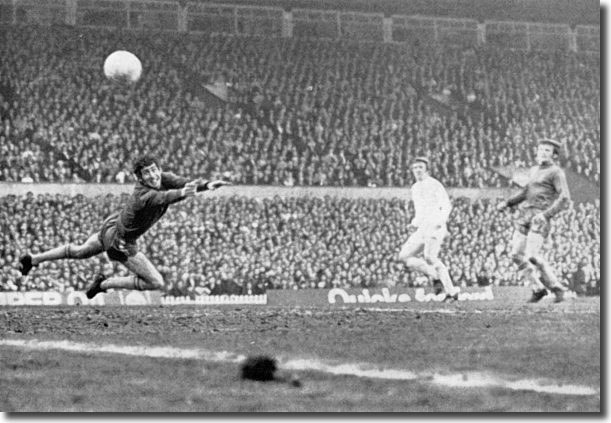 set up a chance. A United defender nicked the ball and Gray brought
play away via a cool one-two with Giles before feeding on to Clarke, ten
yards inside his own half on the left touchline. He set off on a wonderful
diagonal run, escaping three heavy challenges from different Blues men.
Each time it looked like he would be clattered but a combination of pace
and deft feints and swerves took Clarke through the eye of a needle and
left the defenders sprawling in his wake.
set up a chance. A United defender nicked the ball and Gray brought
play away via a cool one-two with Giles before feeding on to Clarke, ten
yards inside his own half on the left touchline. He set off on a wonderful
diagonal run, escaping three heavy challenges from different Blues men.
Each time it looked like he would be clattered but a combination of pace
and deft feints and swerves took Clarke through the eye of a needle and
left the defenders sprawling in his wake.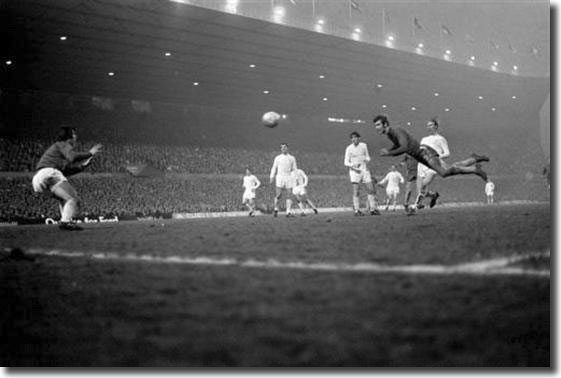 out an intense radiation. It
almost dislocated the senses.
out an intense radiation. It
almost dislocated the senses.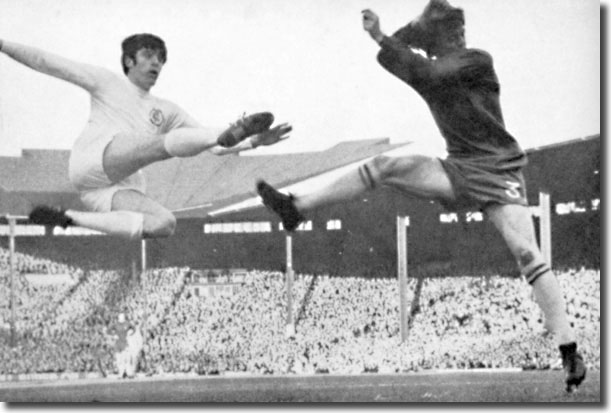 seemed an age.
seemed an age.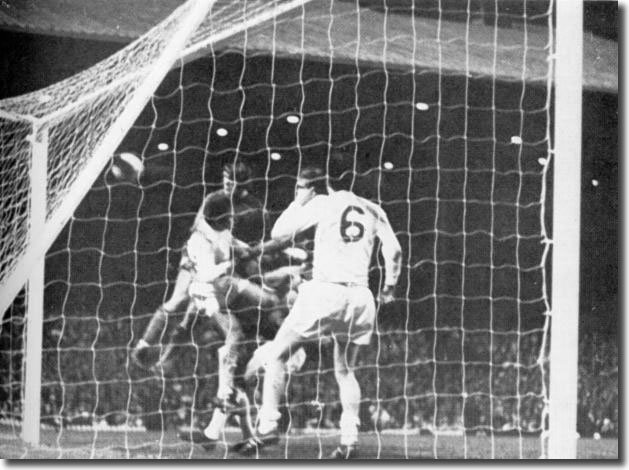 eight minutes to go by Hinton as the Londoners
manned the defensive barricades, but he set up an opportunity for Hutchinson
before he departed, with Harvey left unprotected as his team chased a
late equaliser. Hutchinson put the chance away but the goal was disallowed
for offside.
eight minutes to go by Hinton as the Londoners
manned the defensive barricades, but he set up an opportunity for Hutchinson
before he departed, with Harvey left unprotected as his team chased a
late equaliser. Hutchinson put the chance away but the goal was disallowed
for offside. have had more goals.
Chelsea marked Eddie Gray much tighter this time but we moved him inside
and he got into the game. I have nothing but admiration for the lads because
this was their 64th game of the season and everyone has been full of tension.
They have worked hard, trained hard and played well yet at the end of
the road there has been nothing for them.
have had more goals.
Chelsea marked Eddie Gray much tighter this time but we moved him inside
and he got into the game. I have nothing but admiration for the lads because
this was their 64th game of the season and everyone has been full of tension.
They have worked hard, trained hard and played well yet at the end of
the road there has been nothing for them.